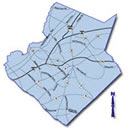Frequently Asked Questions
Are there State supervised probation services?
In some cases, Juvenile Court judges will commit a child to the Georgia Department of Juvenile Justice. Although judges may make recommendations as to placement, once a child is committed the state has the final word in what will happen to him/her. Committed juveniles may be placed in secure detention facilities, outdoor therapy centers, group homes or back in their own homes where they will be monitored by Department of Juvenile Justice court service workers. You may reach the Gwinnett Office of the Georgia Department of Juvenile justice at 770-339-5362.
Runaway Child (JUV 25-256)
Filing A Runaway Child Complaint: The Gwinnett County Juvenile Court is located on the third floor of the Gwinnett Courthouse in Lawrenceville, Georgia.
The Legal Definition of a Runaway Child: In order to be considered a runaway, a child must "desert" their home; that is to leave without the intent to return. Under Georgia law, parents or custodians of children under the age of 18 may charge those children with running.
What steps should be taken in a Runaway Child Situation?
- In the first step, when a child runs away, the parent should contact the local police department and file a runaway report.
- If a police officer encounters the child, he can take the child into custody on the strength of that report alone.
- However, parents should follow up the initial report with a visit to Juvenile Court. Here a warrant to pick up the runaway child can be issued. The warrant will then be forwarded to the Sheriff's Department where it will be entered on to the Georgia and national criminal information networks. This means that, if the child is encountered by law enforcement anywhere in the country, a computer check will reveal that he is a runaway and he will be held until he can be returned to Gwinnett County.
- When a parent comes to Juvenile Court to have a warrant issued, he will be asked to complete a Complaint form charging the child with runaway. While these charges cannot be filed electronically, a copy of the Complaint form is provided here so that a parent can print it and complete it before coming to the Court. This is designed to lessen the time parents must spend at Juvenile Court.
Emergency trouble with a child (JUV 25-629)
If your child is in immediate danger of harming himself or others, or if he has lost control and is destroying property, CALL 911. The police are trained to bring such situations under control. Once the situation is stabilized, any resulting charges will be forwarded to Juvenile Court for later action.
Youth is held in custody? (JUV 25-630)
If a juvenile is taken into custody by the police for a delinquent or unruly charge, he/she will be held at the Gwinnett Regional Youth Detention Center until a first appearance in court. Operated by the Department of Juvenile Justice, the RYDC is located on Hi Hope Lane in Lawrenceville. Telephone them at 770-995-2144 for visiting hours and other information.
I suspect a child is abused or neglected. What should I do? (JUV 25-631)
If you suspect a child is abused or neglected, report this to either the Gwinnett Department of Family and Children Services at 678-518-5630 or to the Gwinnett County Police Department at 770-513-5122. Your identity will be kept confidential. If your child has been taken into emergency custody because of an unsafe situation, he/she will be in the temporary custody of the Department of Family and Children Services until an emergency court hearing is held. To contact the Department of Family and Children Services, call 678-518-5630.
Truancy from school (JUV 25-632)
If you are having problems with your child concerning school attendance, you should first speak with a counselor at your child's school. If you would like additional information concerning truancy problems, you may call Gwinnett County Juvenile Court at 770-619-6300 and ask to speak with an intake officer or a probation officer.
Juvenile Traffic Court (JUV 25-633)
Any child sixteen years old or younger who is charged with a traffic offense will be referred to Juvenile Court. Juvenile Traffic Court arraignments are held on Friday afternoons once a month. Your arraignment court date should be written on your citation. If not, call Juvenile Court at 770-619-6333. During arraignment, the child may either admit to the offense and have his/her case disposed of immediately or deny the offense and have the case set for trial. Juvenile Traffic Court trials are held one or two days each month. At trial, the state must try to prove the case against the juvenile beyond a reasonable doubt by presenting witnesses and evidence. The juvenile (and his attorney, if the decision is made to hire one) may also subpoena witnesses and present evidence. The law doesn't provide for jury trials in Juvenile Court, so the final decisions at trial are made by the judge. Some traffic offenses may be handled out of court by paying a fine. To learn if your offense is one that can be handled out of court and what the fine will be, call Juvenile Court at 770-619-6333. It should be noted that, even if the ticket is handled by paying a fine and not going to court, the child who was charged and one parent or guardian must come to Juvenile Court together in order to do this.
Juvenile Probation (JUV 25-635)
If your child is placed under the supervision of the court for a delinquent or unruly act, they will be under the supervision of the Gwinnett County Juvenile Court's Probation Unit. We have our own Probation Unit independent of the state's Division of Juvenile Justice. The probation Unit is responsible for supervising your child while they are on probation with the Court. They are responsible for making sure your child follows the rules of probation and pays any fines, fees or restitution ordered by the Court. If you have any questions regarding probation call 619-619-6020.
CHANGE OF RESIDENCE: If a child is on probation or commitment status and his family moves to another county or another state, his supervision will be transferred to the Juvenile Court in his new home. During any phase of the Juvenile Court proceedings, from the arrest to the termination of the disposition, it is the responsibility of the child and his parents to keep the Court informed of any change of address.
Committed children to the State of Georgia (JUV 25-636)
In some cases, Juvenile Court judges will commit a child to the Georgia Department of Juvenile Justice. Although judges may make recommendations as to placement, once a child is committed the state has the final word in what will happen to him/her. Committed juveniles may be placed in secure detention facilities, outdoor therapy centers, group homes or back in their own homes where they will be monitored by Department of Juvenile Justice court service workers. You may reach the Gwinnett Office of the Georgia Department of Juvenile justice at 770-339-5362.
Custody matters (JUV 25-637)
Matters Involving permanent custody of children are under the jurisdiction of Superior Court. In some cases a Superior Court judge will refer the case to Juvenile Court for determination of what is in the best interest of the child. All custody matters must first be filed in Superior Court.
Need an attorney? (JUV 25-651)
Children in Juvenile Court have a constitutional right to a lawyer. If the child wants an attorney, but the family can't afford one, the Court will appoint one. Sometimes the Court appoints a lawyer even if one is not requested in order to protect the interests of the child. Many youths coming before the court do not have lawyers because the nature of the offenses is minor and the risk of loss of property or freedom is small. As the severity of the crimes increases, or if the charges are denied, the need for an attorney increases. The child and his or her parents should discuss their need for a lawyer and make a decision.
Court appointed guardians for children (JUV 25-652)
LAWYERS AND GUARDIANS: The Department of Family and Children Services is represented in court by an Assistant Attorney General. Every child who is alleged to be dependent is appointed a lawyer to represent his best interests in court. These lawyers, who are part of the Juvenile Court staff, are called Guardian ad litem. They consult with their clients, attend hearings, question witnesses, present evidence and make recommendations to the judge. Parents or guardians have the right to be represented by attorneys. As in some other cases, if the parents or guardians cannot afford an attorney, the Court will appoint one to represent them. Attorneys appointed in these cases are specially trained in the areas of juvenile law and dependency.
Criminal acts committed by children (JUV 25-653)
Delinquent Acts are acts committed by juveniles that would be charged as a criminal act if they had attained their 17th birthday. The same rights afforded to adults in these cases must be given to a juvenile and the same rule of evidence applies. If the offense is committed against a family member, the parent or guardian may file the charges the the court system. If the offense is against a non-family member, the police department having jurisdiction should file the appropriate charges. It is mandated by law to release the child to the parent or guardian after he or she is charged, however, if the charge involves aggravated issues, the child may be detained in the Youth Detention Center in Lawrencville.




